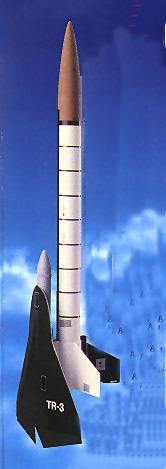(Contributed - by Larry Zeilmann)
Brief:
This is a Booster glider Level 3 construction. The booster returns by
parachute.
Construction:
Booster: 12" BT50 tube with a 4-fin plastic fin case (1 fin is removed
during construction) and plastic nose cone. Two cardboard centering rings are
used on the 18mm engine tube. One metal engine hook is used for engine
retention. Combination 12" Kevlar® and 18" elastic shock cord is
attached to nose cone and engine mount. 12" plastic 'chute is attached to
nose cone of booster. Adhesive decals. Two 1/8" paper launch lugs. Glider:
6" BT5 tube, plastic nose cone, 3/32 balsa wing construction. Adhesive
decals. 1/8" dowel to attach glider to booster.
Easy, well illustrated construction. Removal of one fin on fin canister requires a sharp knife and care. The booster's parachute is the usual cheap plastic chute. The plastic "Grippers" used to attach shroud lines make the 'chute difficult to fold and store in boosters body. Engine hook is very thin and too malleable. Glider can be better balanced with modeling clay and requires moderate effort in getting wing, rudder and ailerons at proper angle. Good construction illustrations and recommendations are provided to accomplish this task.
Finishing:
To finish like illustrated on package taping is required. Three colors are
required, Base white, Nose cone Tan, and Glider under surface Gloss Black.
Nothing is mentioned, but consideration should be given to avoid painting two
surfaces. The surface that the glider slides along on the boosters rack and the
1/8" dowel that holds the glider on to the booster. Painting either of
these might restrict the ease at which the glider will slide off at apogee.
Decals are cut-out, adhesive type which don't always adhere to the complex
rounded surfaces. Clear coat helps with permanent attachment of decals. Very
nice looking rocket when finished.
Construction Rating: 3 out of 5
Flight:
Estimated Max Altitude 500 Feet Motors: B6-4 (First Flight) C6-5 Requires
wadding to protect Boosters chute. I flew the first flight on a C6-5 in
moderate winds. The boost was straight and true. Glider did not separate at
apogee and was recovered with the boosters chute. I believe this supports my
construction tip on not painting the surfaces that connect the booster to the
glider. I have since corrected this issue, but yet to test it again.
Recovery:
Flight recovery is a proven good quest design. 'Chute is well sized for
boosters weight. Minimal drift. Glider didn't separate on first flight due to
previously stated finishing issue. Rocket recovery was a bit fast with no
damage on boosters chute with added weight of glider still attached.
Flight Rating: 3 out of 5
Summary:
This is an easily constructed rocket for calm or moderate winds.
Overall Rating: 3 out of 5
 |
 |
Flights
Date | Flyer | Rocket | Altitude |
|---|---|---|---|
Sponsored Ads
 |
 |














